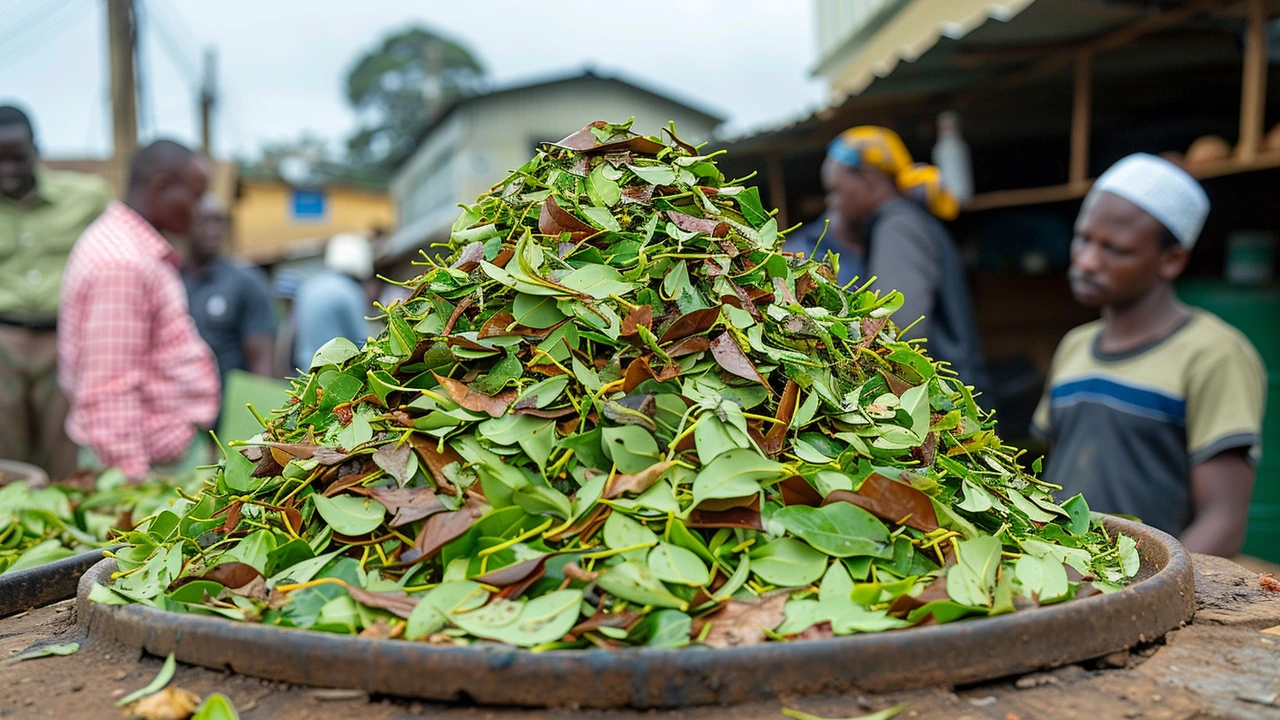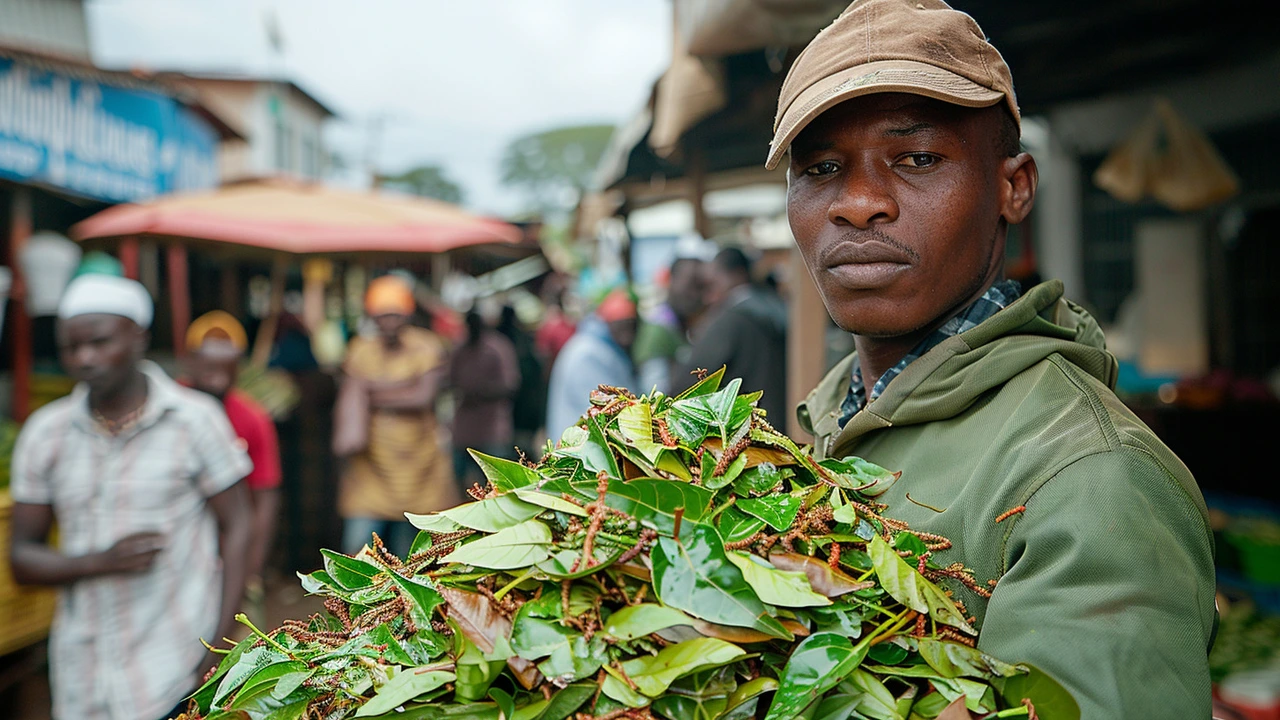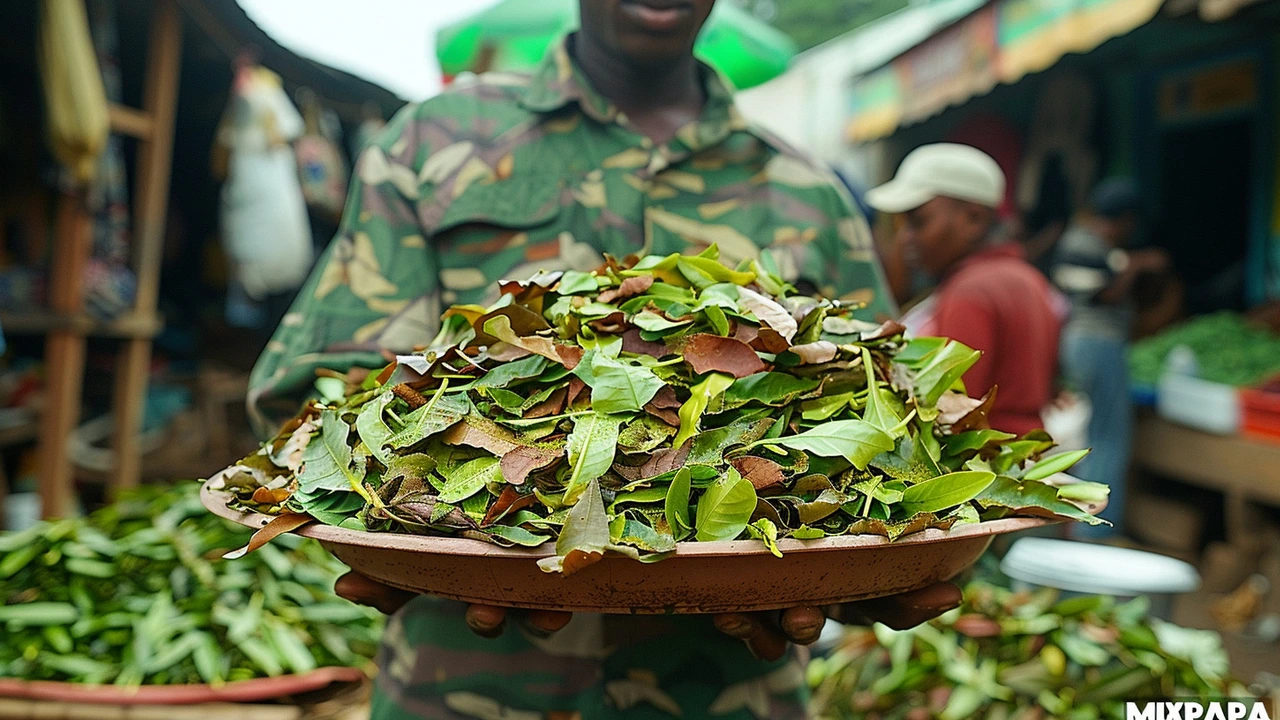President Ruto's Commitment to Muguka Farmers
President William Ruto has pledged to allocate KES 500 million to support muguka farmers in Kenya. This move, announced during a meeting at the State House in Nairobi, is expected to bring substantial relief to the farmers who have been struggling with high production costs and low market prices. The decision to provide this financial assistance recognizes the critical challenges faced by the farmers and aims to address them comprehensively.
The allocation of KES 500 million is set to be utilized for several key initiatives aimed at revitalizing the muguka industry. This landmark decision signifies a concerted effort by the government to not only sustain but also enhance the livelihoods of the farmers who have been enduring considerable hardships. One of the primary areas where this funding will be directed is towards providing subsidies to the farmers, reducing their burden of high input costs.
Challenges Faced by Muguka Farmers
The muguka farmers have been grappling with a multitude of challenges that have hindered their productivity and profitability. High production costs, poor infrastructure, and a lack of access to credit facilities have contributed to their plight. The insufficiency of financial resources has made it difficult for farmers to purchase necessary inputs, thereby impacting the quality and quantity of their crops. Furthermore, poor infrastructure has restricted their ability to access markets and transport their produce efficiently.
In recent years, low market prices have also compounded the struggles of muguka farmers. The fluctuations in prices have made their incomes highly unpredictable, making it difficult for them to sustain themselves and their families. The lack of organized marketing channels has further exacerbated the situation, leaving farmers with limited options to sell their produce at fair prices.

Impact of the KES 500 Million Allocation
The President's commitment to allocate KES 500 million is expected to create a significant positive impact on the muguka sector. The provision of subsidies will directly reduce the cost of production for the farmers, making it more feasible for them to purchase high-quality inputs. This will not only enhance the quality of their crops but also increase their yield, thereby improving their overall income and livelihood.
Additionally, a portion of the allocation will be dedicated to improving marketing strategies for the muguka crops. By establishing organized and efficient marketing channels, farmers will be able to access broader markets and achieve better prices for their produce. This will mitigate the issue of fluctuating market prices and ensure a more stable income for the farmers. Moreover, the government’s efforts to enhance the quality of the crop through research and development will further strengthen the competitiveness of the muguka industry in both local and international markets.
Government's Long-Term Vision for Muguka Industry
President Ruto’s announcement is part of the government’s broader vision to sustain and invigorate the agricultural sector in Kenya. Muguka, being a significant source of income for many Kenyans, plays a key role in this vision. By addressing the immediate challenges faced by the farmers, the government aims to create a sustainable and thriving muguka industry. This allocation is a step towards ensuring food security, creating job opportunities, and uplifting the socio-economic status of the farming community.
The allocation also highlights the government’s recognition of the indispensable role played by the agricultural sector in Kenya’s economy. As the backbone of the country’s socio-economic fabric, empowering farmers through financial and infrastructural support symbolizes a commitment to national development and prosperity.

Farmers' Response to the Announcement
Reactions from farmers have been overwhelmingly positive since President Ruto's announcement. The commitment has infused a sense of optimism and renewed hope among the farming communities. Many farmers have expressed their gratitude towards the President for acknowledging their struggles and taking concrete steps to address them. The announcement has re-energized farmers, encouraging them to envision a more profitable and sustainable future for their industry.
Farmers believe that the subsidies will have an immediate positive impact, allowing them to improve the quality of their produce. They are also optimistic that the enhanced marketing strategies will open up new avenues for them to sell their crops, ensuring better returns. The renewed focus on improving infrastructure and access to credit facilities is also seen as a welcome change, addressing some of the long-standing issues that have plagued the muguka farmers.
The Future of Muguka Farming in Kenya
The KES 500 million allocation is a significant milestone for the muguka farmers but it is only the beginning. The success of this initiative will largely depend on the effective implementation and monitoring of the allocated funds. The government’s continued support and collaboration with the farmers will be crucial in ensuring that the objectives set forth are achieved.
Looking ahead, there is a discerning need for continuous investment in research and development to improve the quality and yield of muguka crops. Fostering partnerships with private sector stakeholders can also bring in new technologies and innovations to further boost the efficiency of muguka farming. Developing a robust and sustainable supply chain will not only enhance the local market but also create opportunities for exportation, tapping into international markets.
In conclusion, President Ruto's pledge to allocate KES 500 million to support muguka farmers stands as a testament to the government’s commitment to uplifting the agricultural sector. By addressing critical issues such as high production costs, poor infrastructure, and lack of access to credit, this initiative lays the groundwork for a more prosperous and sustainable future for the muguka industry. The positive impact of this allocation is set to be felt not just by the farmers but by the broader Kenyan economy, ensuring food security, increasing employment opportunities, and enhancing the overall quality of life for many citizens.







manisha karlupia May 30, 2024
i wonder if this money will actually reach the farmers or if it'll get lost in bureaucratic labyrinths like every other fund... we need transparency, not just announcements.
also, why muguka? why not other crops that feed more people? just asking.
vikram singh May 31, 2024
THIS IS A MASTERPIECE OF POLITICAL THEATRE. KES 500 MILLION? THAT'S NOT A HANDOUT, THAT'S A SPARK IN THE DRY GRASS OF A NATION THAT'S BEEN BURNING FOR DECADES. THE PRESIDENT DIDN'T JUST GIVE MONEY - HE GAVE DIGNITY. THE FARMERS ARE NO LONGER INVISIBLE. THEY'RE LEGENDS.
AND IF YOU THINK THIS IS JUST ABOUT CROPS, YOU'RE IGNORANT. THIS IS ABOUT SOULS. ABOUT HONOR. ABOUT A COUNTRY THAT FINALLY LOOKED INTO THE EYES OF ITS BACKBONE AND SAID: I SEE YOU.
balamurugan kcetmca June 1, 2024
i think people are missing the bigger picture here - this isn't just about subsidies or marketing channels, it's about systemic restructuring. the real win would be if this funding triggers a ripple effect: local cooperatives forming, digital platforms connecting farmers directly to buyers, agro-processing units springing up in rural areas so they're not just selling raw produce but value-added goods. imagine muguka flour, muguka tea, muguka oil - branded, exported, profitable. this could be the blueprint for every smallholder crop in kenya if done right. the infrastructure part is key - roads, cold chains, storage - those are the silent heroes here. and honestly, if they pair this with financial literacy programs, we're talking generational change.
Arpit Jain June 1, 2024
sure, allocate the money. then watch it vanish into the pockets of middlemen, county officials, and some guy named 'john kariuki' who somehow got promoted to 'agricultural liaison' without ever touching a hoe.
they've been saying this for 30 years. where's the audit? where's the tracking? where's the accountability? don't give me poetry - give me receipts.
Karan Raval June 2, 2024
this is a good start but lets not stop here
we need to teach the youth farming is cool again
connect schools to farms
let kids taste fresh muguka and know where it comes from
and please someone make a simple app so farmers can see prices in real time
divya m.s June 3, 2024
THIS IS A TRAP. THEY WANT US TO BELIEVE THEY CARE. BUT WHERE WAS THIS MONEY WHEN THE DROUGHT HIT? WHERE WAS IT WHEN THE FERTILIZER PRICES SKYROCKETED? NOW THEY SHOW UP WITH A CAMERA CREW AND A PRESS RELEASE AND THINK WE’LL FORGET THE LAST 7 YEARS OF NEGLECT? DON’T BE fooled. THIS IS NOT A GIFT - IT’S A PUBLICITY STUNT TO COVER UP THE REAL CRISIS: GOVERNMENT CORRUPTION AND THE DESTRUCTION OF OUR LAND BY FOREIGN CORPORATIONS.
THEY’LL SPEND 500 MILLION ON A PHOTO OP. WE’LL STILL BE STARVING.
PRATAP SINGH June 3, 2024
While the gesture is aesthetically pleasing from a political optics standpoint, one must question the marginal utility of such an allocation relative to the broader fiscal burden. The muguka sector, while culturally significant, contributes a statistically negligible portion to GDP. Would not a more efficient allocation involve capitalizing on high-yield cash crops or investing in agricultural R&D at the university level? This feels less like policy and more like performative populism.
Akash Kumar June 3, 2024
As someone who has lived in rural Kenya for over two decades, I can attest that the emotional weight of this announcement cannot be understated. The dignity of the smallholder farmer is not measured in shillings but in the quiet pride of being seen. This is not merely economic aid - it is cultural recognition. The government has, for once, acknowledged that agriculture is not a charity case but the foundation of our national identity. May this be the first of many such acknowledgments.
Shankar V June 3, 2024
500 million? That’s exactly the same amount that went missing in the last agri-subsidy scandal in 2021. Coincidence? I think not. The president knows the exact amount the last batch vanished at. This is a calibrated distraction. They’re not helping farmers - they’re laundering the same money through a different channel. Look at the contractors they hired - same names, same shell companies. The real beneficiaries? The ones who never even grew a single muguka plant.
Aashish Goel June 5, 2024
i mean... this is kinda nice? i hope it works. but also... what even is muguka? is it like coffee? is it a fruit? is it a spice? i think i saw it once in a market but i was too busy trying to remember if i had my phone charger...
also, can we get a map? like, where are these farmers? is it near nakuru? i wanna visit. i need to see it with my own eyes. also, is there a muguka meme? i feel like there should be a muguka meme.
leo rotthier June 6, 2024
KENYA DOESN'T NEED HANDOUTS. WE NEED HONOR. THIS ISN'T CHARITY - THIS IS RESTORATION. THE PRESIDENT ISN'T GIVING MONEY - HE'S RETURNING WHAT WAS STOLEN FROM OUR LAND. THE COLONIALS TOOK OUR SOIL, OUR SEEDS, OUR PRIDE. NOW WE RECLAIM IT. NO MORE BEGGING. NO MORE PLEAS. THIS IS OUR TIME. OUR CROP. OUR FUTURE. IF YOU DON'T SEE IT, YOU'RE NOT LOOKING HARD ENOUGH.
Karan Kundra June 7, 2024
this is huge but lets not forget the women farmers who do 70% of the work and get 0% of the credit
make sure the money goes to them directly
no middlemen
no husbands signing for them
just them and their land and their dignity
Vinay Vadgama June 9, 2024
It is heartening to witness a leadership initiative that prioritizes the agrarian backbone of our nation. The strategic allocation of resources toward input subsidies, market linkage, and infrastructure development demonstrates a clear understanding of systemic agricultural challenges. This is not merely fiscal policy - it is nation-building in its purest form. May this initiative serve as a model for other developing economies.
Pushkar Goswamy June 11, 2024
they always do this. big announcement. big press conference. then silence. i’ve seen this movie before. the farmers get a t-shirt and a photo with the president. the money? it goes to a guy in nairobi who 'manages logistics'.
but hey - at least the president got a good selfie.
Abhinav Dang June 11, 2024
this is the kind of policy that unlocks multiplier effects - think supply chain development, youth engagement in agri-tech, digital extension services, and localized processing hubs. we’re not just talking about subsidies - we’re talking about ecosystem building. if they partner with fintechs for microloans and blockchain for traceability, we could turn muguka into a flagship export. the real win? when a kid in nairobi buys muguka chips and knows it came from a farm 200km away - that’s cultural capital. that’s pride. that’s the future.
krishna poudel June 11, 2024
you think this is new? i’ve been farming muguka since i was 12. they’ve promised this 5 times. every election cycle. same speech. same photo. same empty promises. now they’re calling it 'vision'? i call it recycling lies.
show me the bank transfer. show me the contract. show me the farmer who got paid. otherwise shut up and stop wasting our time.
Anila Kathi June 12, 2024
this is amazing 🌱👏 but can we make a muguka emoji? 🍃✨ i think it should be a little leaf with a tiny hat and a smile 😊
also, who’s in charge of the marketing? i wanna help. i’m good at instagram. we could do reels of farmers dancing with their harvest. viral content = more sales. trust me.
vasanth kumar June 13, 2024
i grew up watching my dad grow muguka. he never made enough to buy shoes for us. now they say it's important. i just hope they don't turn it into some corporate brand. it's not a product. it's our history.
don't package it. protect it.
Andalib Ansari June 13, 2024
this moment is a mirror. it reflects our collective values - do we value the hands that feed us? or only the voices that shout loudest? the muguka farmer doesn't need a press release. he needs dignity. he needs to know his labor is not invisible. this allocation, if executed with integrity, becomes more than funding - it becomes a covenant. a promise that the soil, the sweat, the silence - they matter. and that, more than any subsidy, is what will truly nourish a nation.